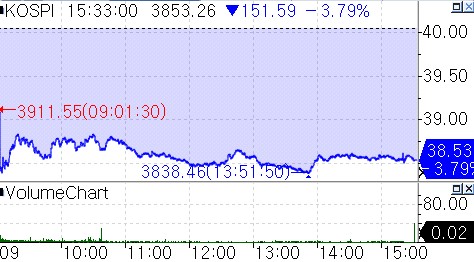
(Seoul=Yonhap Infomax) Young Tae Seo – South Korea’s benchmark KOSPI index closed below the 3,900 mark for the first time in a month, as foreign investors posted their largest net sell-off of the year amid renewed concerns over interest rate cuts, liquidity risks, and debate over an AI-driven market bubble.
According to Yonhap Infomax’s New Stock Composite (screen number 3536), the KOSPI plunged 151.59 points, or 3.79%, to finish at 3,853.26 on the 21st, marking its steepest decline in recent weeks.
This is the first time since May 23 (when it closed at 3,845.56) that the index has ended in the 3,800 range. After reaching a record high of 4,221.87 on June 3, the KOSPI has fluctuated around the 4,000 level amid ongoing market corrections.
The week saw extreme volatility, with the index rising 77 points, plunging 135 points, falling 24 points, rebounding 75 points, and then tumbling 151 points on the final day.
Foreign investors led the sell-off, offloading 2.82 trillion won ($2.1 billion) in KOSPI shares—their largest net selling this year. In the KOSPI 200 futures market, they also posted nearly 300 billion won ($220 million) in net sales.
In contrast, retail investors purchased a net 2.29 trillion won ($1.7 billion), providing some support to the index, while institutional investors bought a net 495.4 billion won ($370 million).
Shares that had previously benefited from the AI theme saw sharp declines. Samsung Electronics Co., South Korea’s largest company by market value, fell 5.77%, while SK hynix Inc., the country’s top memory chipmaker, dropped 8.76%. Doosan Enerbility Co., a leading nuclear power plant builder, and HD Hyundai Electric Co., a major power equipment manufacturer—both considered AI-related plays—plunged 5.92% and 7.85%, respectively.
Concerns over an AI bubble remain persistent. Although Nvidia Corp. reported earnings that beat market expectations, the initial rally in U.S. equities reversed sharply mid-session, with the Philadelphia Semiconductor Index tumbling 4.77% overnight.
Market sentiment was further dampened after Federal Reserve Governor Lisa Cook commented that “asset prices in several markets—including equities, corporate bonds, leveraged loans, and housing—are above historical benchmarks,” adding, “My current impression is that the likelihood of a significant correction in asset prices has increased.”
Hwang Soo-wook, analyst at Meritz Securities, said, “A combination of AI bubble concerns, reversal of monetary policy expectations, and liquidity worries have weighed on the U.S. market. Remarks by Governor Cook and concerns over Nvidia’s accounts receivable were key drivers of the decline. However, liquidity concerns are unlikely to persist, and worries over Nvidia’s receivables are likely overblown.”
Some analysts believe further downside for the KOSPI is limited. Yoo Myung-gan, analyst at Mirae Asset Securities, noted, “While volatility has increased due to AI profitability debates and fading hopes for Fed rate cuts, the recent correction has significantly reduced valuation pressures. Additional declines are expected to be limited.”
ytseo@yna.co.kr
(End)
Copyright (c) Yonhap Infomax. Unauthorized reproduction and redistribution, as well as AI training and utilization, are strictly prohibited.
Copyright © Yonhap Infomax Unauthorized reproduction and redistribution prohibited.

